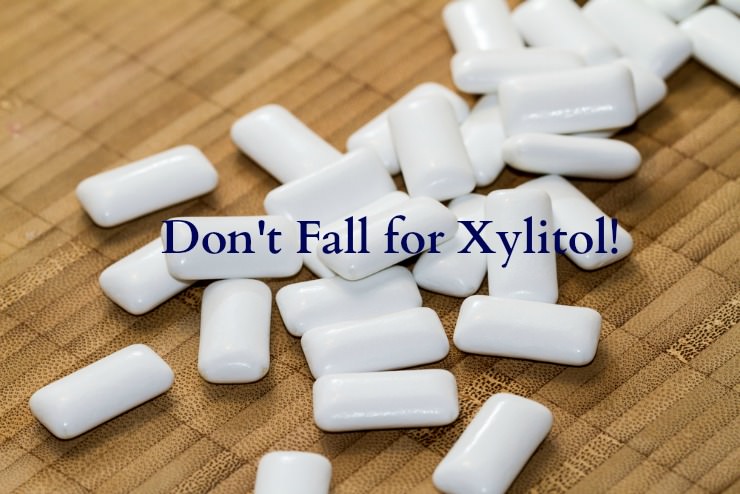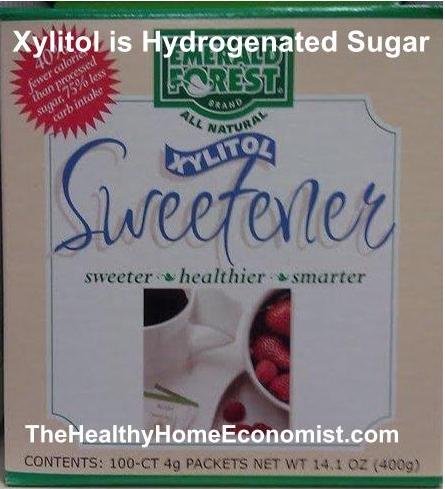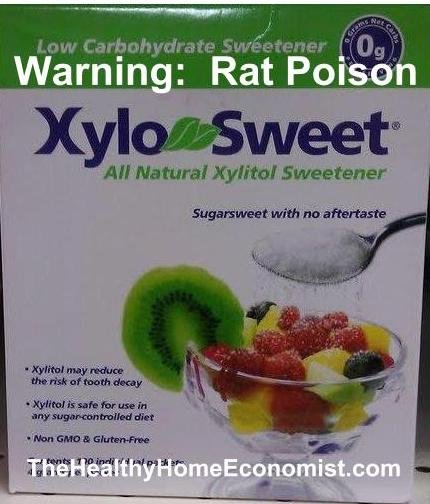
Xylitol is truly the darling of sugar substitutes today. The American Dietetic Association touts its use, with this sugar alcohol sold alone and as a sweetener in a variety of processed foods. Health benefits include a reduced glycemic response compared with sucrose, increased absorption of B vitamins and calcium, and even a reduction in dental caries risk.
Consequently, people with blood sugar issues are flocking to processed foods containing this alternative sweetener as a way to satisfy that sweet tooth without the downside of exacerbating the risk factors for Metabolic Syndrome. This condition is known for the markedly increased likelihood of developing heart disease, stroke, and type 2 diabetes.
Even the healthfood community almost universally considers this sugar alcohol to be a healthy substitute for sugar. A primary reason is that it doesn’t directly contribute toward the growth of intestinal yeasts aka Candida.
Have you noticed that the check out aisles at health food stores are typically loaded with chocolates and other sweets containing at least some xylitol? The truth is that I have yet to talk with any health-conscious person who suggests to me any downside other than the potential for intestinal cramps if you get too much.
Xylitol is Naturally Found in Nature
Xylitol is, after all, a naturally occurring substance. Manufacturers of xylitol market it as derived from xylan. The fibers of many plants contain it, including berries, oats, beets, sugar cane and birch. Sounds pretty harmless at first glance.
The FDA has even granted xylitol GRAS (Generally Recognized As Safe) status. You can’t get any safer than that, right?
 Manufacturing Process
Manufacturing Process
It is true that xylitol is a naturally occurring substance. However, manufactured xylitol is another matter entirely. Food manufacturers produce it using the industrialized process of sugar hydrogenation. In order to hydrogenate anything, a catalyst is needed. In this case, Raney nickel is used which is a powdered nickel-aluminum alloy. (1, 2)
This poses the risk of heavy metal residue and contamination. Nickel, by the way, is a recognized carcinogen and aluminum is associated with the development of dementia. Heavy metals in the body are notoriously difficult to eliminate with frequent use of infrared sauna probably a good idea.
This alternative sweetener doesn’t seem quite so warm and fuzzy anymore, does it?
There is currently no literature on any detrimental health effects of consuming hydrogenated sugar. However, food manufacturers widely used hydrogenated fats for decades before the very damaging effects of cardiovascular health became widely known!
Given the violent industrialized process that is required to produce a hydrogenated sugar like xylitol, it would seem wise to avoid it based on the very poor track record of hydrogenated foods in general.
Most Xylitol Sourced from GMO Corn
While it is true that xylitol can be derived from the xylan of birch trees, xylan is also found in corn cobs. It is much cheaper to use corn instead of birch bark to derive xylitol and so what do you think manufacturers prefer? Corn, of course.
Therefore, unless the label of a xylitol-containing product specifically notes that it is from birch or another nonGMO source, xylitol is very likely from genetically modified corn or possibly GMO sugar beets.
This is the same problem as high fructose corn syrup (HFCS) and white sugar from beets. Food manufacturers rely heavily on these sweeteners in the production of sodas and sports drinks.
You get a dose of GMOs with every sip! More on GMO dangers including sterility and stomach holes at the provided link.
Usage Contributes to Gut Imbalance
The digestive process does not break down sugar alcohols like food. Rather, xylitol arrives intact into the intestines.
At that point, a process called “passive diffusion” takes place. This means that the xylitol draws water into the bowels. Only a partial breakdown is the end result. The unmetabolized portion ferments providing the perfect environment for undesirable bacteria to thrive and grow.
It is true that xylitol itself does not feed candida directly as sugar does. As a result, this artificial sweetener is even promoted as a useful part of the Candida Diet. Unfortunately, the fermentation of undigested xylitol in the gut most definitely can exacerbate yeast problems. Don’t be fooled by this argument!
This is exactly why consuming xylitol can make some folks so gassy and even trigger cramping and diarrhea. Gut pathogens having a heyday in your intestines give off a lot of smelly toxins!
Other Little Known Problems
Xylitol can contribute to acid reflux problems. As a result, those who have issues in this area should avoid it for that reason alone. Chronic acid reflux is a serious problem that can lead to cancer of the esophagus and larynx.
In addition, those who suffer from seizures of any kind should stay away from this alternative sweetener as it can increase the frequency of epileptic attacks.
Two Pieces of Xylitol Gum Can Kill a Rat?
According to unpublished lab tests, approximately 1.65 grams of xylitol kills a 100-gram rat half the time.
Two little pieces of xylitol gum contain about .7 – 1 gram. This is probably enough to meet the definition of rat poison.

Cavity Prevention
Many people are chewing xylitol gum due to compelling scientific evidence for cavity prevention. What about children, however?
Rami Nagel, author of Cure Tooth Decay, doesn’t even recommend xylitol gum for this purpose. His research for any long term safety data turned up the following:
- Epidemiology: No information found
- Teratogenicity: No information found
- Reproductive Effects: No information found
- Mutagenicity: No information found
- Neurotoxicity: No information found
In summary, using this modern substance officially renders you a guinea pig, my friend! It seems that any benefits of cavity prevention are outweighed by the fact that there is no actual safety data backing up its use.
Safe Uses of Xylitol
Given all the problems that consumption of xylitol can trigger, it seems best to bypass the use of this sugar substitute on a regular basis.
Can it ever be helpful? Does it have any benefits whatsoever?
Potentially so. The only time I personally would ever consider using xylitol is to help resolve a childhood ear or sinus infection in order to prevent the use of drug-based antibiotics.
There is evidence that this popular sugar alcohol can indeed help encourage a healthy balance of beneficial bacteria found in the ear canal and sinus cavities. Products like this incorporate xylitol for this purpose.
A therapeutic dose can help resolve infection in these areas quickly with no medication required.
Thus, if you choose to use it, make sure it is sparingly and therapeutically (not as food). Also, make sure it does not come from a GMO source like corn!
References
(1) Xylitol production via catalytic hydrogenation of sugarcane
(2) Catalytic hydrogenation of xylose to xylitol using ruthenium catalyst on NiO modified TiO2 support
(3) Cure Tooth Decay by Rami Nagel
(4) Sugar-Free Blues: Everything You Wanted to Know about Artificial Sweeteners
More Information
Yacon: Healthy Syrup or Healthfood Hype?
Jaggery: India’s Sweet Gift








Thank you Sarah for confirming what I just started to suspect that my 4 years of consuming xylitol has adversely affected my gut health and today I stop using it. I did start out using this for chronic sinusitis and along with manuka honey was able to get rid of it, whic I’m eternally grateful to get rid of that. I then found out it was good for oral health and having no saliva from radiation treatment I had for oral cancer I thought it would be a good idea to use xylitol as a sugar substitute to help save my teeth. About 3 years later I started having bloating and inflammation in my intestines. I had no idea that xylitol was or could be the culprit. I went to a G.I. doctor yesterday and will have a colonoscopy to check things out, but I’m betting it’s the xylitol and I hope by stopping using it maybe things will improve. I just started using Linzess, which helps but I don’t want to be on a drug if I don’t have to and hope I haven’t any permanent damage to my intestines.
So I agree we are guinea pigs for a lot of different things and only time will tell. I would encourage people to do their homework before ingesting anything into their body. Thank you again for your article and I’m hoping things will improve.
The people that are against GMO’s the strongest are the people that know the least about them. Just because a plant was genetically modified does not mean it was sprayed with any chemical (that is the farmers choice) and does not mean it is not less healthy than a non modified one. A crop grown organically on overfarmed groung will have less nutrition than one grown using common farming practices grown in fertile ground.
I’ll get nutritional advice from a dietitian rather than an economist. Stick to what you know, not what you think you know!
It doesn’t matter if a GMO is sprayed or not because a pesticide is GENETICALLY BUILT into the crop! GMO corn are NEVER safe to eat even if you grow them “organically” (but I’ve never heard of a farmer who would do this as GMOs are not allowed to be labeled organic anyway).
there are plenty of studies done showing how safe xylitol is. Rami Nagel does have a point in that if you cut all of your carbohydrates then you shouldn’t get cavities…but really is everybody going to cut all of their carbs. xylitol is by far the best alternative to sugar. your science is wrong in that gut bacteria DO NOT ferment xylitol. the fact that xylitol is non fermentable is why bacteria, and mold cannot use it as an energy source.
Your comment that xylitol comes from GMO corn..again is wrong as I am not aware of any xylitol that is made from GMO corn.
I need gum in my life. I chew 3-5 pieces a day maybe 5-10 minutes each piece. Do you recommend a gum?
I don’t really advocate chewing gum regularly. Occasionally is, of course, fine, but not every day, multiple times a day. Doing so causes the body to produce food enzymes but no food is actually coming into the stomach … hence, in my view it is using the body’s resources up unnecessarily.
So, you’re only talking about the effects of manufactured xylitol correct?
Ask your doctor about hyaluronic acid
Where is the proof for any of your arguments? You cite zero sources, link to no studies. We are therefore left to assume you are just another puppet taking money under the table to write something bad about a product your bribers dislike.
Ummm thank you. You just made the point of the article. There AREN’T any studies on the safety of xylitol … see the article above. ZERO. NADA. Therefore, you are a guinea pig if you are using it as a sweetener.
Funny how cheap easy remedies take a lot of flack. Pharma companies worried you wont buy their expensive useless products. It is very much in their interest, that you are not well.
Which ‘natural’ sugar alternative is best recommended then for people suffering from candida?
No sugars are helpful when recovering from candida. SMALL amounts of fruit, honey and date syrup/sugar are the only sweet things that wouldn’t make situation worse.
I have heart burn issues so bad I throw up into my nose when I sleep. As of recent, I have been sugar free and using xylitol because of Candida. Since using it I have not had heartburn once! Not once! And I am a general health but and have been suffering from chronic heartburn. I think that xylitol like anything could cause complications it as always comes down to everything in moderation. I don’t understand your description in the use of nickel aluminum as a catalyst to hydrogenate the sugar. Could you be more specific? I mean how do you know that every single xylitol manufacture uses this process? Is there no other way? I don’t think it’s sounds accurate. Not all of these companies use gmo corn. Lots do, but some use birch or both American hardwoods.